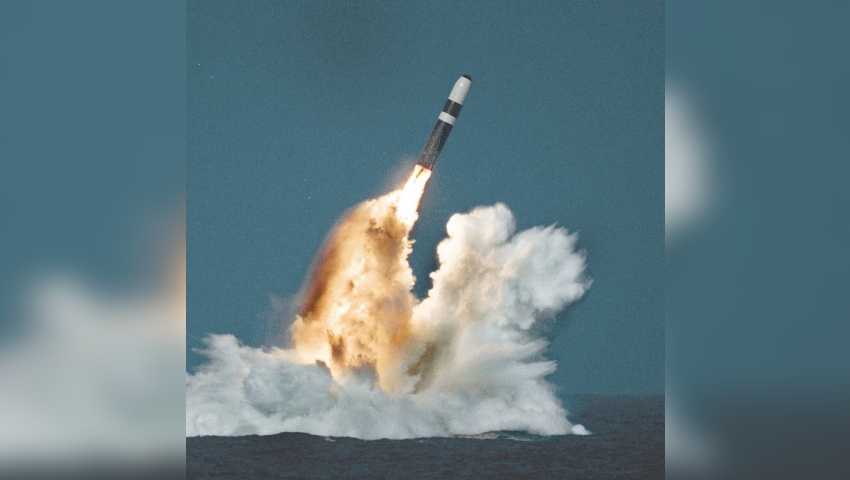Analysts weigh in on the British government’s recent decision to amend its nuclear proliferation policy.
Earlier this year, the British government announced it would increase the cap on its nuclear stockpile from 225 to 260 warheads following an extended period of incremental reductions.
The policy reversal was outlined in the government’s Integrated Review of Security, Defence, Development and Foreign Policy — published in March.
Wyn Rees, professor of international security in the School of Politics and International Relations at the University of Nottingham, and Azriel Bermant, senior researcher at the Institute of International Relations Prague, weigh in on the potential motivations behind the revision.
The analysts note the UK’s historic attitudes towards nuclear proliferation, with Britain previously gauging the size of its stockpile “in concert with the much larger US capability”.
“When Britain obtained the Trident D5 missile from the United States in the early 1980s, the capability exceeded UK military needs and the decision was taken not to deploy the maximum number of warheads on the missile,” they write in a piece published by the Australian Strategic Policy Institute (ASPI).
“The Trident submarines could carry more warheads and strike more accurately than the UK believed was necessary.
“The size of the UK nuclear force has been guided over the years by considerations of what constitutes a ‘minimum deterrent’. The UK has sought to put a certain number of enemy targets at risk.”
But Rees and Bermant observe that the UK’s latest policy pivot reflects changes in the geopolitical environment, with the government itself pointing to a “deterioration” in the strategic landscape and emerging technological threats.
“Russia has been overhauling its nuclear forces since 2007 and investing in new technologies such as underwater nuclear drones and hypersonic missiles. China has been increasing its nuclear capabilities and its current hostility towards Taiwan increases the risk of a China–US confrontation,” they continue.
However, according to Rees and Bermant, improvements in Russia’s missile defences have played a particularly important role in the UK’s decision.
“Western intelligence has been monitoring Russia’s comprehensive upgrade of its missile defences around Moscow and neighbouring areas, and it’s not the first time that anti-ballistic missile improvements around the Russian capital have influenced UK strategic thinking,” they write.
“Recently declassified papers in Britain and the US demonstrate that such concerns were being expressed as far back as the early 1980s and even resulted in a spat between Margaret Thatcher’s government and Ronald Reagan’s [administration].”
This “spat”, the analysts note, was triggered by Reagan’s decision to push ahead with the Strategic Defense Initiative (SDI), which regarded the 1972 Anti-Ballistic Missile (ABM) Treaty as a “constraint” on the deployment of US and Soviet missile defences.
“However, the British government regarded the ABM Treaty limiting the deployment of missile defences as essential to preserving strategic stability and enshrining a concept of deterrence based upon the threat of nuclear retaliation,” they write.
“It viewed this as the key to stability and to safeguarding the UK’s nuclear deterrent.”
Rees and Bermant add: “Britain was concerned that the possible demise of the ABM Treaty and the US deployment of space-based missile defences would lead to the Russians improving their own defensive systems with damaging consequences for Britain’s independent nuclear deterrent.”
The analysts claim the treaty’s eventual collapse has created “unease” in Britain, with Russian President Vladimir Putin pointing to the US withdrawal from the treaty in 2002 as a justification for the development of new nuclear capability.
Putin has been quoted as saying: “After the US withdrew from the Anti-Ballistic Missile Treaty, we’ve been working hard to develop new promising weaponry systems and this enabled us to make a big step forward creating new strategic [arms].
“US global missile systems are mainly against ballistic missiles and these are the core of our nuclear deterrent.
“This is why Russia has been developing extremely effective systems to defeat missile defence and all our ICBMs are equipped with such systems now.”
As such, Rees and Bermant conclude that the UK’s fears, first expressed during the Cold War, have now resurfaced.
“The UK has decided that increasing its offensive nuclear capabilities provides the most cost-effective way to offset the risks it faces and it’s prepared to tolerate the opprobrium of enlarging its stockpile of the most destructive weapons known to humankind.”
Get involved with the discussion and let us know your thoughts on Australia's future role and position in the Indo-Pacific region and what you would like to see from Australia's political leaders in terms of partisan and bipartisan agenda setting in the comments section below, or get in touch with



